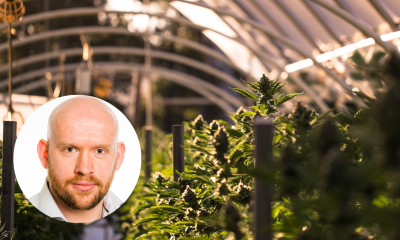Interviews
Alfredo Pascual: “The medical cannabis markets in Europe are growing. Some companies are actually doing well.”
Published
8 months agoem
By
Laura Ramos
At 36 years old, Alfredo Pascual is an unmissable name in the cannabis industry and a guest speaker at numerous international conferences. Born in Uruguay, where he grew up and lived most of his life until about ten years ago — when he moved to Germany to do a master's degree in Public Policy —, he started working in the cannabis industry at the end of 2016. He is currently executive director of SEED Innovations, an investment company also focused on the medical cannabis industry in Europe.
Tomorrow, September 16th, Alfredo will participate in a discussion panel entitled “Navigating the global landscape of cannabis investments", at CB Expo & Conference, which takes place today and tomorrow at the Kongresszentrum and Brauturm in Dortmund, Germany. The complete event program can be consulted here.
The debate, moderated by the consultant from Tocar Strategic Advisors and partner of Hanway Associates, Georgia Glick, also has Matt Francini, partner at Gron Ventures, Andrey Makiyevskiy, from Leafy Tunnel, Yonatan Meyer, investor and consultant (formerlyCasa Verde Capital), and Alfredo Pascual.
We spoke with Alfredo Pascual and found out more about how Uruguay overcame the 1961 Single Convention to legalize cannabis, his work in the industry and what he thinks about investment opportunities in the sector.
[Please note that this text was originally written in Portuguese and is translated into English and other languages using an automatic translator. Some words may differ from the original.]
Alfredo is from Uruguay, which was the first country to legalize cannabis. What was your perception about the plant when you were younger and how has it changed?
That certainly had a big influence, I would say, because I moved to Germany exactly when Uruguay was legalizing [cannabis] in 2013. And, before moving to Germany, I was following the process very closely in Uruguay, of course. When I moved to Germany, to do a Master's in Public Policy, I was also very interested in knowing how this legalization was going to be implemented in Uruguay, which was an unknown territory, being the first country to do it at an international level. ; the states of Washington and Colorado, in the USA, did so a year earlier, in 2012, but only at the state level. At a national level, Uruguay was the first to do so, in 2013, the year I moved to Germany. So, of course, I followed Uruguay's legalization closely and, in some ways, I was concerned about the restrictive way in which certain parts of the legalization were being planned, in terms of not really creating a market, but rather a very controlled system. by the State, with many restrictions, probably unnecessary, in the sense of, for example, having real THC limits that, in the beginning, and until very recently, were less than 10% for commercially available cannabis. Other things, like the fact that very few companies can cultivate and that, until recently, only two varieties or strains/cultivars of cannabis were commercially available. So, yes, I was following this closely because, obviously, the more restrictions of this type are included in legalization, the more complicated it will be to put an end to the illicit market, because, obviously, many consumers will continue to get their product from illicit sources if What is offered in the new legal market comes with many obstacles.
Do you consider, then, that perhaps one of the biggest obstacles to legalization is the 1961 United Nations Convention? How did Uruguay overcome this issue?
Certainly one of the biggest obstacles that countries face when they intend to legalize cannabis for non-medical and non-scientific purposes, in simpler terms, for recreational purposes or adult use, is the 1961 Single Convention, of which basically all countries in the world world are signatories. This treaty is generally interpreted to restrict the use of cannabis to medicinal and scientific purposes only. There is also an exception for industrial hemp, but when it comes to cannabis with a high THC content, so to speak, the interpretation is that it is only intended for medicinal and scientific purposes.

Alfredo Pascual was in Lisbon at the invitation of PTMC – Portugal Medical Cannabis, in 2022 – Photo: Renato Velasco | PTMC
So how can countries justify legalizing cannabis for adult use?
It is indeed a challenge. Not an impossible challenge, because we have the example of Uruguay and Canada, which did it and are still there. However, countries need to carefully consider how they justify legalization internationally. In the case of Uruguay, what the country did almost ten years ago was justify its legalization with several different arguments. One of the most important arguments that Uruguay used was that it was not actually ignoring or not directly complying with the Single Convention. What Uruguay did was to say that treaties have to be interpreted in light of their object and purpose and argued with the fact that the object and purpose of the Single Convention are in the first words of its preamble, which say something relating to the parties concerned with the health and well-being of humanity. Therefore, if we are concerned about the health of our population, we must realize that the ban has not worked to protect them and that we need to try something different to achieve the same objective as stated in the Single Convention. Uruguay also said something like “we continue to want to achieve this objective, just by doing something different, which is to have a regulated form of access for adults”. This was, therefore, one of Uruguay's arguments – interpreting the Single Convention in light of its object and purpose and giving priority to that interpretation, to the detriment of a more textual interpretation, particularly of article 4 of the Convention, which is the one that limits cannabis to medicinal and scientific purposes. That was one of the arguments. There were other arguments that Uruguay used, one of them being the primacy of Human Rights. He said he could not just comply with the Single Convention and ignore other international obligations related to Human Rights and, in case of doubt, Human Rights take priority over drug control. Thus, legalization based on positive Human Rights was another argument that Uruguay used to justify its legalization. And there were other things that were mentioned at the time, including constitutional provisions and the fact that consumption and, to some extent, possession of cannabis was already legal in the country, but consumers had no legal option to access it. There was, therefore, a contradiction. It could be argued that it is quite comparable, in a way, to the case of Portugal, where users have the possibility of consuming certain substances and even possessing them, to a certain extent, but do not have any legal way of accessing them. . This is a contradiction of the law, because we are forcing them to turn to an illegal market. Therefore, these were Uruguay's arguments. And, of course, the INCB [International Narcotics Control Board], which is known as the “watchdog” of drug control conventions, the International Narcotics Control Board, and the United Nations (UN), which is largely responsible for trying to enforce the treaties, they did not like Uruguay's approach. But I would say that, although at the beginning, ten years ago, the INCB was strongly against the Uruguayan initiative, over the years, it is not that they accepted this approach, but they stopped having such a strong position against it and accepted it. as a reality. And then Canada legalized it, of course, being a country that is much larger in terms of GDP [Gross Domestic Product], population and, obviously, size, than Uruguay. It appears that this is something that the INCB will not be able to stop anytime soon. And now we have, in 2023, the German government's plans to legalize in a limited way the production and sale of cannabis for adult use.
“Obviously, many consumers will continue to get their product from illicit sources, if what is offered in the new legal market comes with many obstacles”
How do you think Germany will overcome these European Union conventions, treaties and rules? [Editor's note: at the time of this interview, the bill which proposes to legalize the adult use of cannabis in Germany had not yet been approved nor was its text known]
It will be somewhat comparable to what Uruguay did ten years ago, but we still need to see the effective interpretation of the law. Once we have access to the draft law, I imagine what we are likely to see is that Germany will focus heavily on a health center approach and try to justify legalization by saying that it is actually a more appropriate way of protecting the health of citizens than than the ban.
So do you think that was the reason that led Germany to legalize the adult use? In your opinion, what were the main reasons that led Germany to move forward, given that it is one of the most conservative countries in Europe?
Well, it's always a combination of factors, isn't it? In other words, it is not just one thing that explains the whole and, sometimes, several factors align; and then we have the very likely possibility of cannabis being legalized. Of course a large part of this is political and the fact that the current coalition government in Germany, the so-called Ampel or “traffic light” Coalition, is made up of three different parties, two of which have been in favor, or largely in favor , of legalization for some time, in particular the Green Party, which several years ago tried to introduce a legalization bill in parliament, which ended up failing, but they have long been known to be in favor of legalization. And also the FDP, or Liberal Party, which, once again, has been in favor of legalization for a long time. Both parties had, in their program, before the elections, the intention of legalizing cannabis. And the third party, the main party of the coalition, the SPD, or Social Democratic Party, which is traditionally divided in terms of legalization or not, being, in recent times, more in favor of legalization. In terms of their program, before the elections, what they had said was that they were open to the idea of experimenting with recreational cannabis. So, not immediate full legalization, but they were open to experiences perhaps comparable to what happens in Switzerland or the Netherlands. So when these three parties got together and formed a coalition government, it became quite obvious that they would have to address the issue of legalizing cannabis, because two of the three parties were very much in favor of legalization, the third was in favor of ( at least) experiences, and when they wrote the coalition agreement they dedicated a paragraph or two to cannabis. That's how it all started, I would say.

Alfredo Pascual participates in a panel discussion entitled “Navigating the global cannabis investment scenario”, at CB Expo, which takes place today and tomorrow at the Kongresszentrum and Brauturm in Dortmund, Germany
When do you foresee adult use becoming a reality in Germany?
It is hard to say. Basically, it is up to Germany to pass the law in Parliament, in particular the Bundestag or the Lower House of Parliament, where the government has the majority needed to pass the law.
Do you think there will be a domino effect?
Yes and no. It will certainly be much easier for other countries to follow Germany and it seems that several countries are waiting to see what happens in Germany, and then move forward with their own plans. If Germany finds a way to do this, then it seems very likely that several other countries will follow. Perhaps some other country will take the lead before Germany. This is a possibility. For example, in the Czech Republic, things seem to be going pretty well at the moment, but, yes, let's assume that Germany is the first to legalize the commercial production and sale of cannabis for recreational purposes; So, it does not seem unlikely that other countries, including the Czech Republic, in particular, Luxembourg, perhaps even Portugal, the Netherlands, will follow Germany's path. Will this have a domino effect across the EU? I don't think so, neither in the short nor in the medium term. Just because Germany is doing it does not mean that all other countries will follow. It is true that Germany is the largest country in the EU in terms of GDP, but not everything that Germany does, everyone else does, such as tax policy, energy policy, refugee policy. In recent years, Germany has done things in its own way that have not been followed by all other EU Member States. And I think the same will happen with cannabis. I don't see countries like Sweden, for example, legalizing cannabis right after Germany, simply because Germany did it. In fact, I see them probably opposing Germany's plans.
“Germany, in particular, has a medical cannabis market that has been growing by double digits, since its creation in 2017, year after year, until now”
Nowadays we have a cannabis industry in Europe, in most countries. In Portugal we have many companies, but some are not doing very well at the moment. What's happening with cannabis? Is it a good time to invest in cannabis?
I think it depends on why you want to invest in cannabis and the specific company you are talking about. In other words, it is true that many companies are having difficulties, in part because these companies, or many of these companies, were created in times when it was easy to access capital with very low interest rates and money flowing into the technology industry. cannabis, cryptocurrencies and many other industries that could be considered to have a lot of growth ahead and these companies are, in general, not profitable, and are expected to have positive cash flow only in a few years. Everything changes when interest rates rise and now investors evaluate these companies less favorably because they discount expected future cash flows at higher rates. At this moment, they want to see more immediate results and this becomes a challenge. So, yes, several companies are having difficulties. But that's one way of looking at things. The other way to look at it is that markets are growing. Medical cannabis markets in Europe are growing. It is true that they are not yet large markets, especially if we compare them to the North American markets. But yes, Germany in particular has a medical cannabis market that has been growing by double digits since its creation in 2017, year after year, until now. And some companies are doing well, not most of them, because it is an industry that (as many people expect it to be a big industry) attracts many companies from the moment there is an expectation of a favorable change in regulation in the future. So it quickly becomes a very competitive and crowded environment. But some companies are actually doing well.

Alfredo Pascual is currently the executive director of SEED Innovations. Photo: DR
If you could advise companies or people who wanted to enter the cannabis sector right now, what advice would you give?
My advice always starts with “Why?”. Why would you want to enter the cannabis industry, one way or another? What are your skills, your knowledge, your unique experience, that would be useful to the cannabis industry? I advise you not to get into the cannabis industry simply because it is expected to be big or because it is a “cool” thing to do. What the cannabis industry needs is professionalism and skills that can come from many different parts of the world, including cultivation, finance, journalism, etc. But at the end of the day, it's always about the “why?”: Why do you want to join the cannabis industry as an investor, as an operator, as an employee of a company? What is valuable to the cannabis industry?
And what are the areas that you consider most suitable for investing at this moment?
It always depends on the investment objectives. And, once again, it’s a question of “why?” Why would you want to invest in the cannabis industry? Is it because you expect medicinal markets to grow, in which case you might want to take a purely medical approach to these types of things, ignoring the recreational part, or is it because you expect recreational markets to open up, like in Germany or other EU countries ? Want to prepare for this recreational opportunity? Or is it because you are an expert in the pharmaceutical industry and want to invest in research and development companies and then try to develop cannabis-derived medicines that will eventually have marketing authorization and be prescribed like any other medicine? In other words, we could even talk about industrial hemp, something completely different, in a way. The universe of possibilities is very vast. It depends on why you want to invest in the cannabis industry.
And why did you decide to work with cannabis?
Being Uruguayan, and having closely followed the process in Uruguay, before moving to Germany, in the year of legalization in Uruguay, and after taking a master's degree in Public Policy in Germany, I tried to put it all together and thought it would be interesting trying to work in an industry that is starting in Europe, at least the legal industry, and yes, being part of it, shaping it in a certain way as well.
Were you passionate about the plant? Because many people enter this sector because they love the plant, in some way.
In my case, it was more because I was passionate about good Public Policies. And that means not banning it.
What about patients and their access rights? We know that many patients do not have access to cannabis.
Of course, this is another bad policy.
If you could decide, what policies would you implement to ensure everyone has access to cannabis?
Well, it depends on the jurisdiction we are talking about. I think the first thing policymakers should do when considering access to medical cannabis is to really understand what has been implemented in other countries and how it has worked to date. And probably talk to patients or patient associations, who know best how cannabis treatment is working for them and can provide better information than other experts.
____________________________________________________________________________________________________
[Disclaimer: Please note that this text was originally written in Portuguese and is translated into English and other languages using an automatic translator. Some words may differ from the original and typos or errors may occur in other languages.]____________________________________________________________________________________________________

What do you do with €3 a month? Become one of our Patrons! If you believe that independent cannabis journalism is necessary, subscribe to one of the levels of our Patreon account and you will have access to unique gifts and exclusive content. If there are many of us, we can make a difference with little!
-
Laura Ramoshttps://cannareporter.eu/author/partner/
-
Laura Ramoshttps://cannareporter.eu/author/partner/
-
Laura Ramoshttps://cannareporter.eu/author/partner/
-
Laura Ramoshttps://cannareporter.eu/author/partner/
Related News
-


Sweden: Hemp company provides insulation for world's biggest construction project
-


Hemp by-products are a good alternative for feeding lambs.
-


Santa Cannabis: From Granny's Health to Civil Disobedience
-


Bedrocan expands medical cannabis production to Denmark
-


Pure Healing sets new record: 29% THC on Auto Skywalker Haze
-


Zimbabwe wants to raise hemp THC limit to 1%

Mais recentes


USA: DEA accepts recommendation to reclassify cannabis
The Drug Enforcement Administration (DEA) accepted the recommendation from the Department of Health and Human Services (HHS), a federal agency of the States...


Mila Jansen explains why, at age 80, she is considered the Queen of Hash: “I have grown plants my whole life”
Mila Jansen was born in Liverpool in 1944, but became a citizen of the world from an early age. She tried cannabis for the first time...


Álvaro Covões, who acquired land from Clever Leaves, says he has “no interest in growing cannabis”
At the beginning of April, we reported that Álvaro Covões, founder and CEO of 'Everything is New', had purchased the land where he was located...


Portugal's regulatory advantage in the cannabis industry
In the dynamic landscape of European cannabis cultivation, Portugal has emerged as an interim leader. Although it shares many natural advantages with...


ICBC Berlin shines again. It's the beginning of a new era for the cannabis industry in Germany
ICBC Berlin was the first major international cannabis conference to take place after the legalization of adult use in...


USA: Mike Tyson products recalled for mold contamination
California authorities have issued a mandatory recall notice for two products from Mike Tyson's cannabis brand,...


4:20 is coming and there are celebrations in Porto and Lisbon
The date for celebrating cannabis culture is approaching! This Saturday, April 20th, is the day when...


Paul Bergholts, alleged leader of Juicy Fields, detained in the Dominican Republic
Paul Bergholts, the alleged leader of the Juicy Fields pyramid scheme, has been detained in the Dominican Republic and will be subjected to...


Cannabinoids reveal promising results in the treatment of Borderline Personality Disorder
An investigation carried out by Khiron LifeSciences and coordinated by Guillermo Moreno Sanz suggests that medicines based on...


Juicy Fields case: 9 detained by Europol and Eurojustice. Scam exceeds 645 million euros
A joint investigation conducted by several European authorities, supported by Europol and Eurojust, culminated in the arrest of nine suspects...







